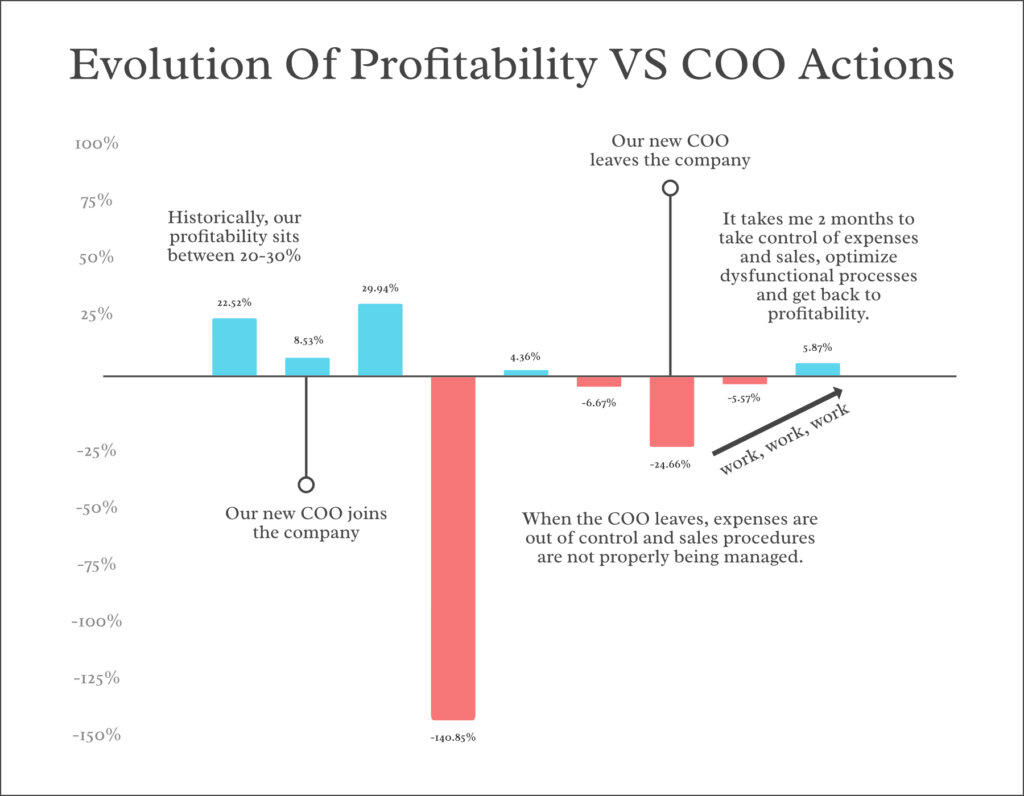Choosing The Wrong COO Can Ruin Your Business

When the COO of this story parted ways with our company. I was relieved to see this person go. I learned the hard way that choosing the wrong COO can ruin your business. Immediately after they left, I had to take control of the operations again to repair all the damage they had done.
This post is a cautionary tale for CEOs or startups looking for a COO. The Chief of Operations is a key piece in your company. The person you hire can have a huge impact on the business, for good or, as in my case, for bad.
Note: I will refer to this person with the neutral pronoun them/their and without using their name to protect their privacy.
Why Did I Hire A COO?
At the time, we were at an inflection point. There were exciting products in the pipeline and an ambitious expansions in sight. However… all that requires money if you want to do it right.
Thus, we started a fundraising process. Under normal circumstances, fundraising is a full-time job that requires 100% of the CEO’s time and energy. Nowadays, it is even more challenging. The world is bracing for a massive recession, multiples have crashed, and Venture Capital firms are much more weary of investing, especially in new startups. Simply put, we are going through a VC winter.
I needed help. Apart from taking care of the strategic stuff, I was wearing the COO hat at the time, overseeing all things operational. I was already struggling to handle the operations alone, so I was not in the position of starting a fundraising round without the help of a full-time COO.
After a short hiring process, we found a candidate that would allow us to scale to the next level, or so we thought.
Launching A Profitable Bootstrapped Business Is Hard
Regardless of whether we got the round or not, I knew I was not willing to play the “All or nothing” startup game. I had always been proud of the fact that Companio was profitable from the very first day. That’s not an easy achievement when you are bootstrapped.
It requires a lot of work, especially at the beginning. You have to do most of the stuff yourself, wear multiple hats (CEO, CTO, CFO, support, designer, developer, marketer, etc), and work a lot (moonlighting until you can pay yourself a minimum salary).
Then there comes the day when you need your first employees because you can’t handle everything yourself anymore. When you don’t have VC cash to burn, looking for people who believe in the project and don’t expect to earn a lot of money (American startup style) is very difficult. You have to make compromises. When the company, apart from Miguel and I, only had two employees, I kept on working as a freelance developer to pay the bills. All the money the company earned was used to pay their wages and grow.
As the company grows, you are constantly worried about cutting down expenses and increasing your revenue to be able to keep your team happy and offer them the salary they deserve, all while keeping or ideally increasing your net profitability. It’s hard. You fight for every euro of profit.
How Choosing The Wrong COO Can Ruin Your Business?
To give you an idea of the disaster that unfolded during the six months that this person was in charge of operations, it is better to have a look at the data. Our average profitability had mostly been around 20-30%.
In the first three months, we had an IT glitch that made many of our payments fail. Our new COO failed to take proper action to recover all those payments. Later, I had to take the reins again and define a procedure to identify and recover those payments.
Even if they didn’t act decisively, you can still argue that the glitch was not their fault. That’s a fair point. However, some months later, even when revenue kept on increasing, we started to run into loses. It all got into a climax where I was really worried not only about the financial results, but about other aspects of the COO’s behavior. That’s when we parted ways.

To give you some data for your reference, when the COO left the company, we had more than two hundred customers with pending payments, more than one hundred customers stuck in the onboarding process, some of them for more than a year (most of these customers just needed someone to keep track of their progress and organize the right processes with customer support), and many customers whose offboarding had not been correctly completed.
Fortunately, things are under control now. Had I left this person continue (even when they announced they were leaving the company because they didn’t feel motivated), this COO would have led us to bankruptcy. This is no joke. Choosing the wrong COO can ruin your business.
So how can you prevent this from happening? Let me share some of the lessons I learned.
Beware Of Fake Gurus
You may be wondering, how did you end up hiring this person? Well, everything looked amazing in the CV. They looked like the perfect candidate to hire. Great experience, previous exit on their own startup, unbeatable education… They seemed to good to be true (spolier, they were).
This person portrays themselves as a startup guru. An expert optimizing processes, increasing revenue, and finding new sources of income. Even in our case, this person claims they doubled the revenue of our company in one quarter. That simply didn’t happen.
That was our fault, we didn’t thoroughly check their references. I should have called the CEOs of some of these startups to be sure this unbeliavable resume was legit. Currently, I don’t believe anything this person has ever posted or shared online. You shouldn’t believe your candidates either.
Always, and I mean always, ask the candidate for references of the previous positions you see in their CV. Choose the ones you want to call, don’t let them choose. If there is an important gap in the resume, ask why and what was this person doing during that time.
Look for doers, not managers
How is it possible that this person didn’t realize there were more than two hundred customers with pending or failed payments? How is it possible that there were customers lost in the onboarding process for more than one year without our COO noticing?
Well, that’s because they were probably aware of it. They simply ordered someone to take care of the situation, but didn’t care to get down to business. Not enough, at least, to reverse things. As far as I can see, this person mostly gave the orders and, with few exceptions, left the employees to deal with that shit alone.
That is the recipe for disaster. In the context of a growing startup, people come from different backgrounds and are at different skill levels. Some of them need guidance, and the task of a good COO is not simply giving orders and forgetting about them, but tracking the progress, encouraging and training the employees, and supporting and helping in every way possible.
Make sure you are hiring a doer, not a manager. Managers who refuse to get their hands dirty are a cancer for any organization. This is especially true for a startup.
Mind Your Corporate Culture
When our COO finally realized things were not going well, because the employees they had simply dispatched the orders to, like a fan spreading shit, were not up to the task, they got angry and entered a “fire them all” rage spree.
When notifying me about the situation, instead of supporting their concerns with data and talking in a professional way, this person opted to insult them, claiming, among other things, that they were not even good to fill in the beans of a coffee machine.
Now, even if you are right, and these people are not doing their job correctly (which turned out to be true for one of them at least), by resorting to insults and contempt, you immediately turn the listener against you.
I don’t know why this happened. I can only assume that this treatment had to do with the fact that this person comes from a culture in which respect to certain communities or groups may be still lacking. That, however, is unacceptable in our startup. Two of our strongest values are uttermost respect and diversity.
I can’t stress enough the importance of choosing a COO that fits in your corporate culture. Look for someone with progressive ideas, someone who stands by the values of respect, diversity, and inclusion. Someone who cares about their teammates.
Trust, But Verify, Your COO’s Work
When we had our first conversation, after being hired, I told the new COO: Do whatever needs to be done, you have full control over expenses and employees, but with one condition, keep the company profitable.
I was frequently accused of micro-management by the COO. However, I think I should have been more vigilant indeed. I started to see weird expenses like fancy office equipment, out-of-schedule salary increases, etc. Perhaps -I thought- I’ve been too tight-fisted, and that’s the change of mindset we need to embrace a full modern-startup culture. Anyway, it is ok as long as we keep on being profitable.
My mistake was trusting without verifying, shame on me. I thought I had learned my lesson. In my defense, when the new COO joined, I was so relieved that I was more than happy to trust this person to finally be able to focus on the CEO stuff.
This person also didn’t understand the moment our company is at. Their formula for success was: Let’s increase everyone’s salaries, buy them fancy office stuff, and free subscriptions to fitness clubs and massage parlors. Happy employees means more productivity and that means more sales and explosive growth…
… Only, that does not work. Maybe in fairy tales or heavily funded startups. Down here, on planet earth (especially when you are bootstrapped), you need to care about profitability. I’d love to carelessly offer all that to my employees, but if you go bankrupt and all these people lose their jobs, you are betraying them.
Beware Of Power-Hungry People
The COO is one of the most important positions in a company. Apart from the CEO, nobody has more power in the organization.
It’s easy for this person to get drunk on power. In my case, I soon started to receive complaints from all other C-Levels and some employees about the dictatorial ways of the new COO. It got to a point where I found myself between a rock and a hard place. I was trying to keep the company together while not interfering or undermining the authority of my new COO. I felt trapped, and I knew I could not win. That sucks.
As a CEO, you need to honor the power and responsibility of the COO and give them room to do the changes that are necessary. Still, keep on verifying. Don’t micro-manage this person, but analyze the results based on data, make questions, request clarifications, and make sure the COO is aligned with your points of view. That last point is important.
Make sure the COO is humble enough to still consult the most relevant issues not just with you, but with the other C-Levels and (especially) with the people they have issues with. Make sure this person is bringing harmony to your company, not destroying it.
Self-criticism And Lessons Learned
When something goes wrong and people are involved, it’s usually not the fault of a single party. In this case, I also learned a lot about things that I can do better next time.
One of them includes not giving misleading expectations to the COO. When they joined the company, we decided on a growth schedule. When we applied that program, I realized that it was too ambitious, and applying it may have broken the company into pieces. I should have been more explicit and express my concerns better about the excessive pressure that was being put on some members of the team, but I was afraid of discouraging the COO in the process.
Also, I should have been more clear about the fact that we are not a typical startup. Growth cannot come at any cost. We are not playing “All or nothing”, as I mentioned. Perhaps this person was expecting that, as it is the most common way of playing this game.
Conclusion
I hope this post would be useful if you find yourself looking for a Chief of Operations, and will save you from some headaches. Choosing the wrong COO can ruin your business, so be sure not just to do a good selection process, but also to work closely with the new hire to make sure this person fits your vision and corporate culture.




Comments ()